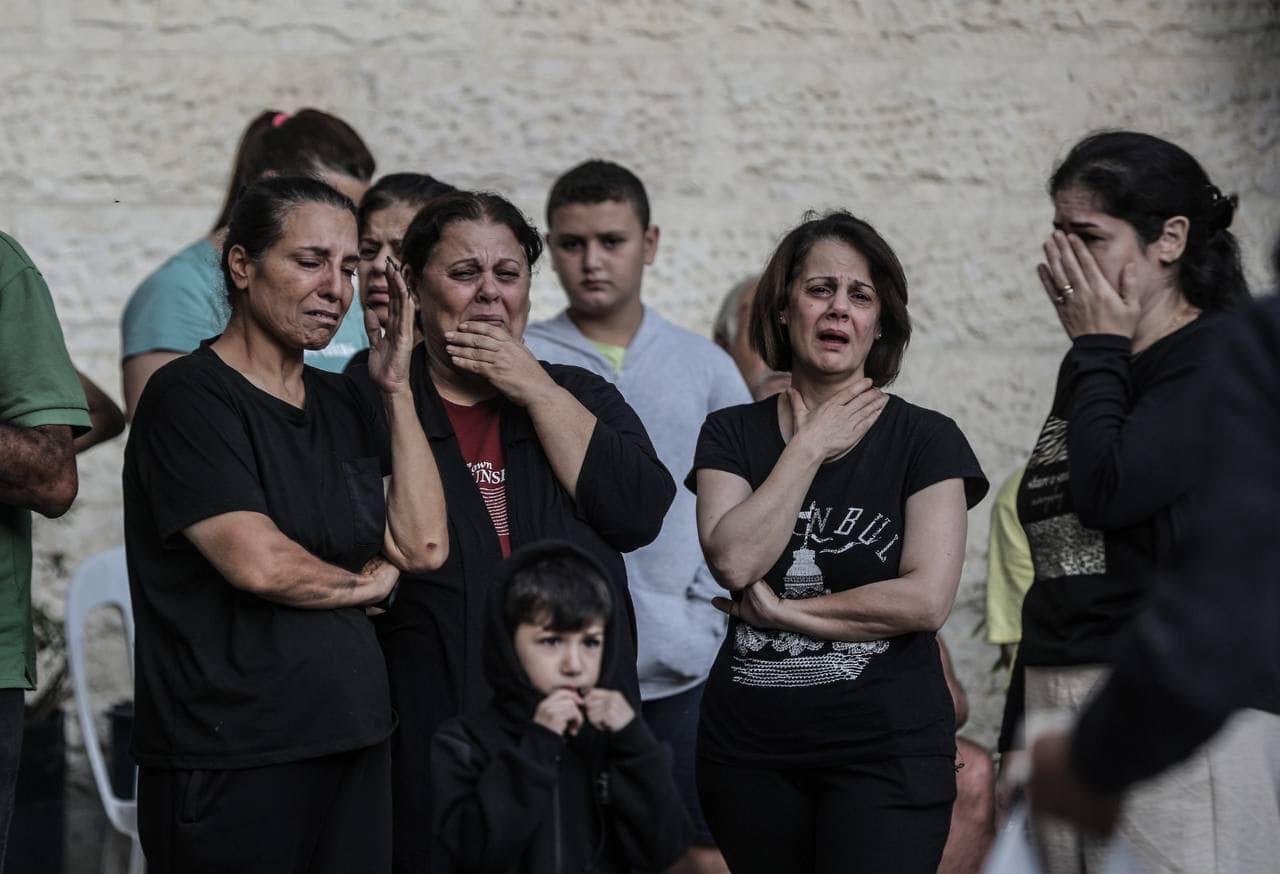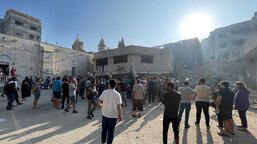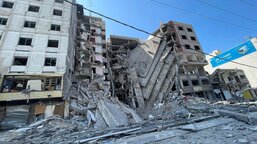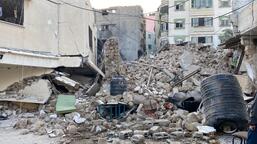In response to the ongoing conflict between Hamas and Israel and the humanitarian catastrophe in the Gaza Strip, the global organisation Caritas Internationalis, of which we are also a member, has issued a statement: "Now is the time for peace". It calls for an immediate cessation of fighting in the Holy Land, respect for international humanitarian law, the release of hostages and the immediate provision of humanitarian aid to the people of Gaza.
Donate and help civilians in Gaza
Humanitarian disaster
Caritas continues to express deep concern about the ongoing humanitarian catastrophe and violations of international humanitarian law and human rights law unfolding in the Holy Land (Gaza, Israel and the West Bank), and causing an unprecedented level of suffering. The conflict has already killed more than 12,000 people (almost 16,000 people as of 23rd November), injured tens of thousands, and displaced over a million innocent people in Gaza alone of whom almost 50% are children, while at least two hundred and thirty civilians remain held hostage. Without de-escalation, this crisis also threatens wider regional conflict and further humanitarian needs. The forced displacement of tens of thousands of people in Southern Lebanon serves as an illustrative example.
The humanitarian situation in Gaza is desperate with critically growing needs, as heavy bombing intensifies, essential services cut, and humanitarian access severely restricted. Over 10, 000 civilians ( 14,500 people as of 23rd November), have been killed in hostilities, with many others at risk of starvation, dehydration, disease, trauma and lack of access to critical medical treatment. About 2.3 million civilians in Gaza are left without protection and are in desperate need of lifesaving water, shelter, food, medical supplies and care. Medical services are collapsing under the weight of demand for treatment, exhausted medical personnel, declining and uncertain access to power, lack of essential medicines and notable damage due to the nature of hostilities.
Inadequate access to humanitarian aid
Humanitarian assistance via the Rafah crossing from Egypt, on which 80% of the population rely, amounts now to no more than 4% of the daily average volume prior to current hostilities. Furthermore, fuel to power water supply and sewage treatment facilities has been blocked. Widespread attacks on civilian objects and infrastructure have been consistently documented by the United Nations, including in supposed “safe zones”. There is no safe place, there is no way out, there is simply no respite for the civilian population.
The situation in the West Bank is also deteriorating rapidly with increasing threats to civilian lives, restrictions of free movement, arbitrary detentions and widespread degrading treatment of Palestinian populations, as documented by the United Nations. Caritas also deplores the sharp rise in ethnic and religious intolerance and hatred, including antisemitism and islamophobia.
Demanding a ceasefire and unlimited humanitarian aid
In the light of the above, Caritas reiterates its call to all parties to the conflict to strictly adhere to their obligations under international humanitarian law and international human rights law. The lives and dignity of civilians must be protected and respected, in all circumstances.
Caritas also continues to appeal to all parties to the conflict, and to the international community, to intensify diplomatic action to:
- Urgently de-escalate the hostilities and implement an immediate ceasefire;
- Urgently grant unimpeded safe humanitarian access to and across all of Gaza, and allow large-scale aid operations, including through the reopening of the Karem Abu Salem crossing;
- Protect civilians, and distinguish between civilians and combatants in adherence to the principle of distinction;
- Immediately and unconditionally release civilians held hostage and all those arbitrarily detained, and ensure that all prisoners and hostages are treated with respect due to their inherent dignity;
- Preserve civilian infrastructure and immediately restore services essential to the survival of the civilian population, including but not limited to water, food, health, fuel and power systems;
- Respect the protection and security of humanitarian personnel, their assets, and relief items;
- Rapidly facilitate the evacuation of patients requiring medical treatment or protection from Gaza, while also ensuring their right to return to their homes as soon as they wish to do so;
- Work towards a durable two-state solution, echoing Pope Francis’ call.
Long term consequences
The humanitarian and human rights consequences of this conflict will be devastating and long-lasting, firstly for the populations in the Holy Land, but also in the region at large. The Holy Land deserves peace and a renewed living together in harmony and tolerance.
Continued violence is not the answer. As the Holy Father reminds us, “Every act of violence committed against a human being is a wound in humanity’s flesh; every violent death diminishes us as people… Violence leads to more violence, hatred to more hatred, death to more death. We must break this cycle which seems inescapable” (Encyclical letter, Fratelli Tutti, §227).
Caritas joins its prayers with people of all faiths who pray for peace, understanding and reconciliation and for a durable, just future for all peoples in the Holy Land and the region of the Middle East.
Written on 13th November.
Donate and help civilians in Gaza












